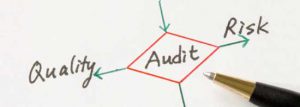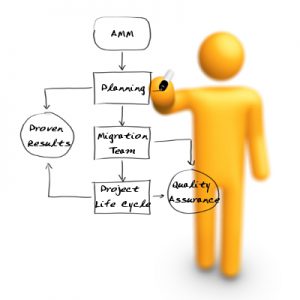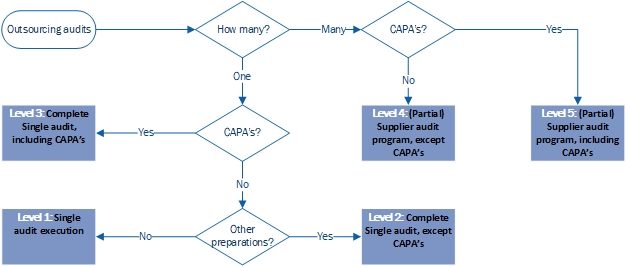5 Levels of outsourcing your supplier audit program, and when to use them.
Last month we saw why it was a good idea to outsource your supplier audits to professional auditors. We concluded it was both cheaper and faster and also creates more flexibility, consistency and objectivity. While performing (your) supplier audits, at least five levels of outsourcing can be distinguished. Each of these levels brings its own benefits.
Here are the 5 levels we distinguish in outsourcing your supplier audits and our reasons for using them:
1: Performing a Single audit:

What is the Situation:
An individual audit is scheduled, the audit plan has been created and, after the audit, you will send the report to the supplier. You will review and approve both the response and CAPA plan the supplier sends. This is usually the first step a company takes in outsourcing its supplier audits.
When to use:
- When a problem arises regarding performing a scheduled audit, you can hire a professional auditor to conduct an already planned audit in order to prevent missing the audit date and/or going overdue with the audit schedule.
- This way of outsourcing is perfect for engaging new professional auditors as you gain experience with their way of working. You can determine whether they fit into your organization, exude the style and project the image to your suppliers just as you intended.
2: Completing a Single audit, except CAPAs

What is the Situation:
A single audit is outsourced to a professional auditor. The audit will be scheduled together with the supplier. An agenda will be drafted and sent out. Then the audit will be performed and reported and, consequently, the report will be sent to the supplier by the professional auditor. Finally, the supplier´s response and CAPA plan have to be reviewed and approved by you.
When to use:
- When you experience that, in your organization, you don´t have enough capacity to perform all the required supplier audits, but want to be in control of the CAPAs the supplier sends nevertheless, to ensure that organizational requirements are met.
- You would normally be able to handle all the audits yourself but just need that bit of extra help to get everything done without going overdue.
3: Completing a Single audit, including CAPAs

What is the Situation:
A single audit is outsourced to a professional auditor. The audit will be scheduled together with the supplier. An agenda will be drafted and sent out, followed by the audit and audit report. Consequently, this report will be sent to the supplier. Finally, the supplier´s response and CAPA plan will be reviewed and approved by you.
When to use:
- For some of your suppliers, you do not need to be involved in the CAPA plan after the audit, e.g. because they are less critical to your organization. However, you still need to ensure that they are compliant with regulations.
- You want the professional auditor to follow up on the CAPAs, review the documented evidence, chase the timelines, discuss insufficient actions, etc., because … well … you need to be time-conscious yourself.
4: (Partial) Supplier audit program, except for CAPAs

What is the Situation:
A partial or complete supplier audit program is outsourced to the professional auditor. All audits with suppliers are scheduled, agendas are drafted and send out to the suppliers.
When to use:
- When you are not able to perform supplier audits, e.g. due to shortage or unavailability of staff. By outsourcing audits partially or completely, you can rest assured that all conditions of the supplier audit program are being met and will be on time. Besides, in this way you still have control over CAPAs sent by your suppliers and show serious involvement in your supplier management as well, while delegating the actual audits to professionals.
- When you are not working with staff that is well trained. Now, you can rest assured that conditions of the supplier audit program are being met, and will be on time, while you work on getting your staff trained to perform supplier audits: Click here to find out how to get your auditors trained.
- You have staff available to review CAPAs, determine their effectiveness, review documented evidence and communicate with the supplier about details and timelines.
5: (Partial) Supplier audit program, including CAPA’s

What is the Situation:
A partial or complete supplier audit program is outsourced to the professional auditor.
When to use:
- When you are not working with staff that is available to perform supplier audits. This way you can rest assured that all conditions of the supplier audit program are being met, and will be on time.
- When you are not working with staff that is well trained. Now, you can rest assured that all conditions of the supplier audit program are being met, and will be on time, while you work on getting your staff trained to perform supplier audits: Click here to find out how to get your auditors trained.
- You do not have the staff available to review CAPAs, to determine their effectiveness, review the documented evidence and communicate with the supplier about details and timelines.
In order to show sufficient involvement in your supplier management program, e.g. during inspections, there should be a regular review of the final supplier status. The professional auditor can help you with this.
Although we distinguish 5 levels, there are many details and nuances that can create a multitude of different ways of doing things. There can be a few steps between outsourcing single audits vs. the complete program. However, all these different ways cannot be described in a short blog like this, so we have highlighted the different possibilities we work with the most.
As with all situations, we can help you solve your problems at whatever level you desire. Contact us to find out how we can help you.
